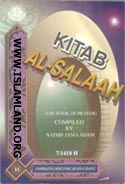Kitab Al-Salaah (The book of Prayer)

Salatul-Istisqua
(Rain Seeking Prayer)
Drought is a natural calamity which when it befalls causes undue
hardships and disaster to all living matter. It is for this reason,
that the Prophet (peace be upon him) made it a custom on the Ummah to
resort to this prayer whenever affected by this calamity and seek the
mercy and grace of Allah (subhanahu wa ta'ala) to shower on them His
bounty of rain.
This
prayer is performed similar to the 'Id (Feast) prayers in all respects.
It may be performed anytime during the daylight except those times when
the performance of voluntary prayers is prohibited. Muslim scholars are
largely of the opinion that the best time for its performance is the
same time for the performance of the 'Id prayers i.e. after about
twenty (20) minutes from clear sunrise.
In
the sermon at the end of the prayer, the Imam (leader) will exhort the
congregation of the need to repent and return to Allah (subhanahu wa
ta'ala) pointing out that the lack of rain is the result of the sins of
mankind.
The
Imam would thereafter raise his hands in prayer and the congregation
would also do the same. It is confirmed that the Prophet (peace be upon
him) used to raise his hands in prayer until his armpits appeared.
While in this situation, the Imam and the congregation are required to
invoke Allah (subhanahu wa ta'ala) as much as possible and call upon
Him for forgiveness and to shower on them His bounties. Allah
(subhanahu wa ta'ala) says in the Holy Qur'an: “ ... ask
forgiveness from your Lord, for He is Oft-forgiving, He will send rain
to you in abundance” (Qur'an 71: 10-11).
Note: It is desirable that the head of the Muslim state or his
representative gives prior notice to the Muslim community of the need
to perform "Salatul-Istisqua" at a certain future date. This is to
enable as large a congregation as is possible to attend the prayer.
